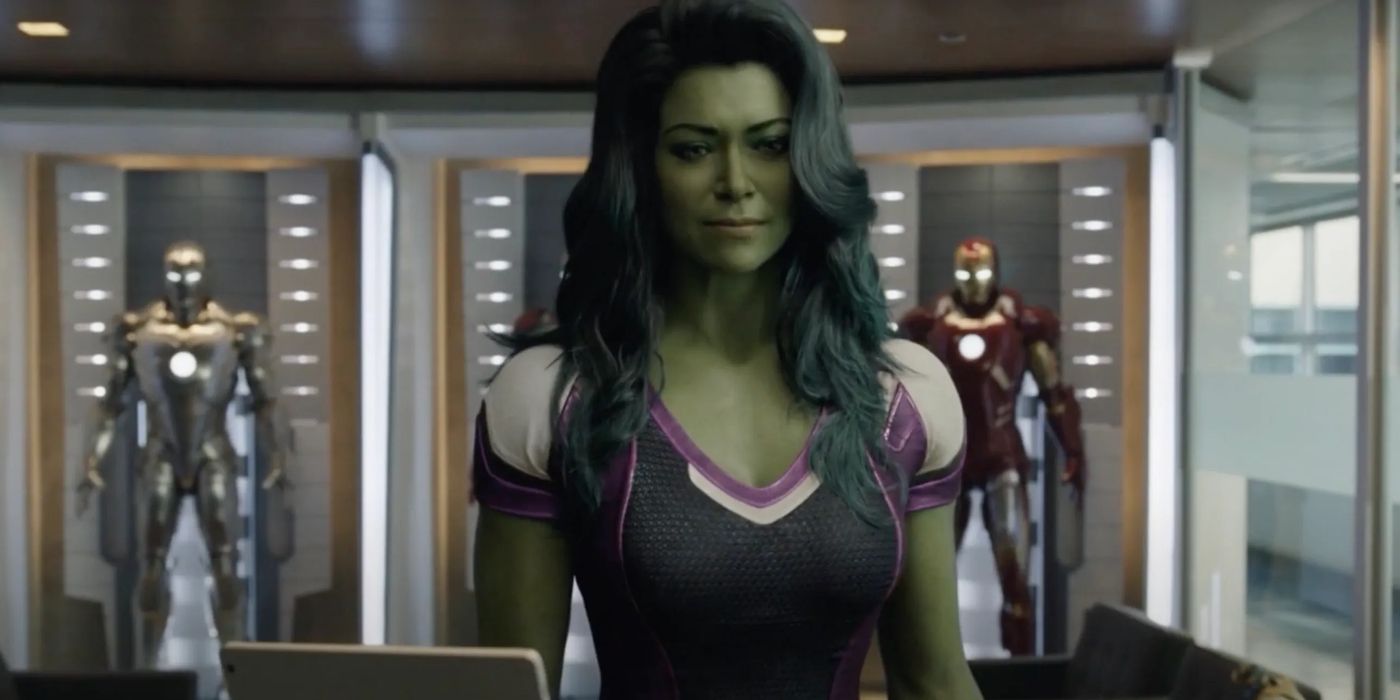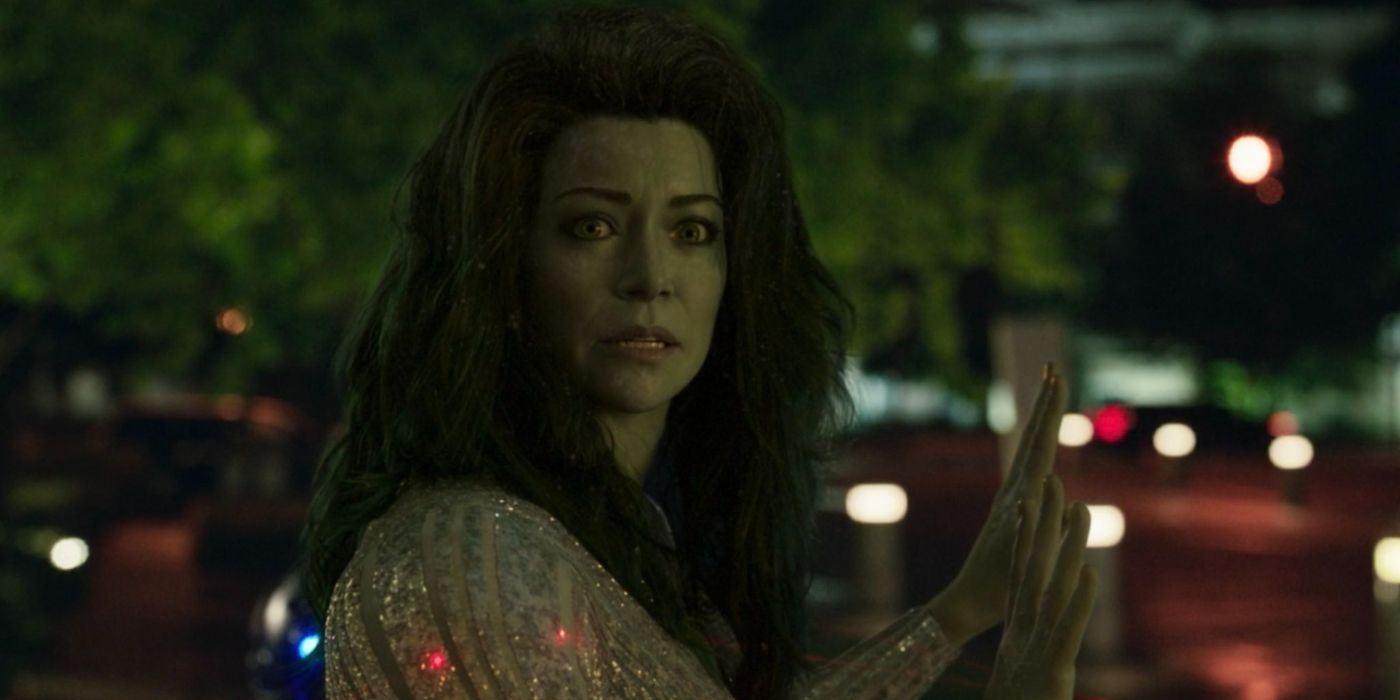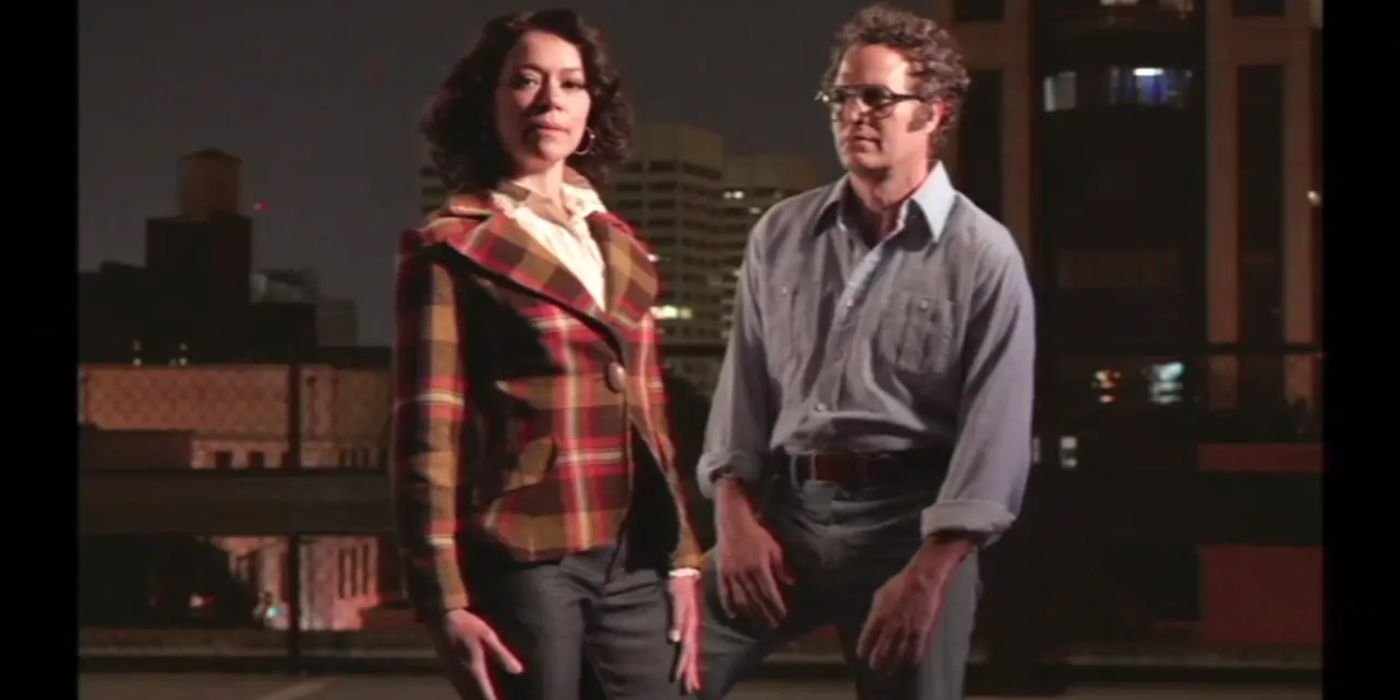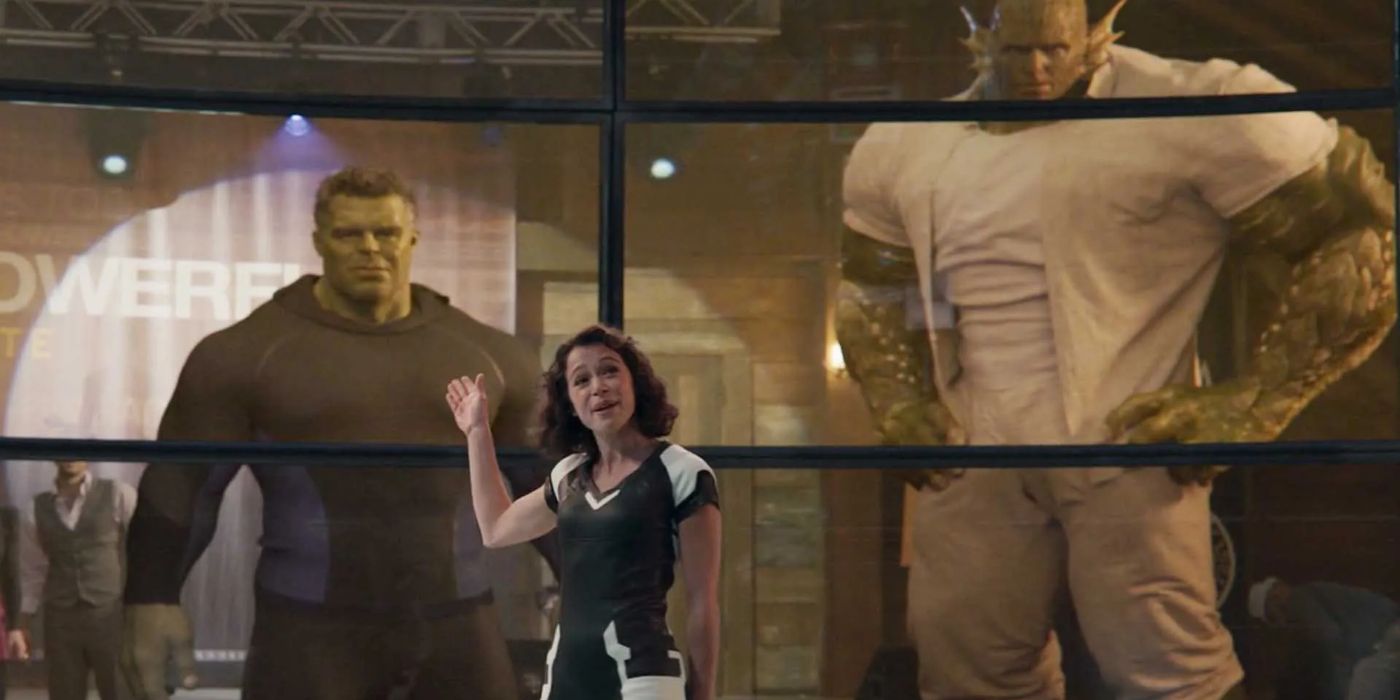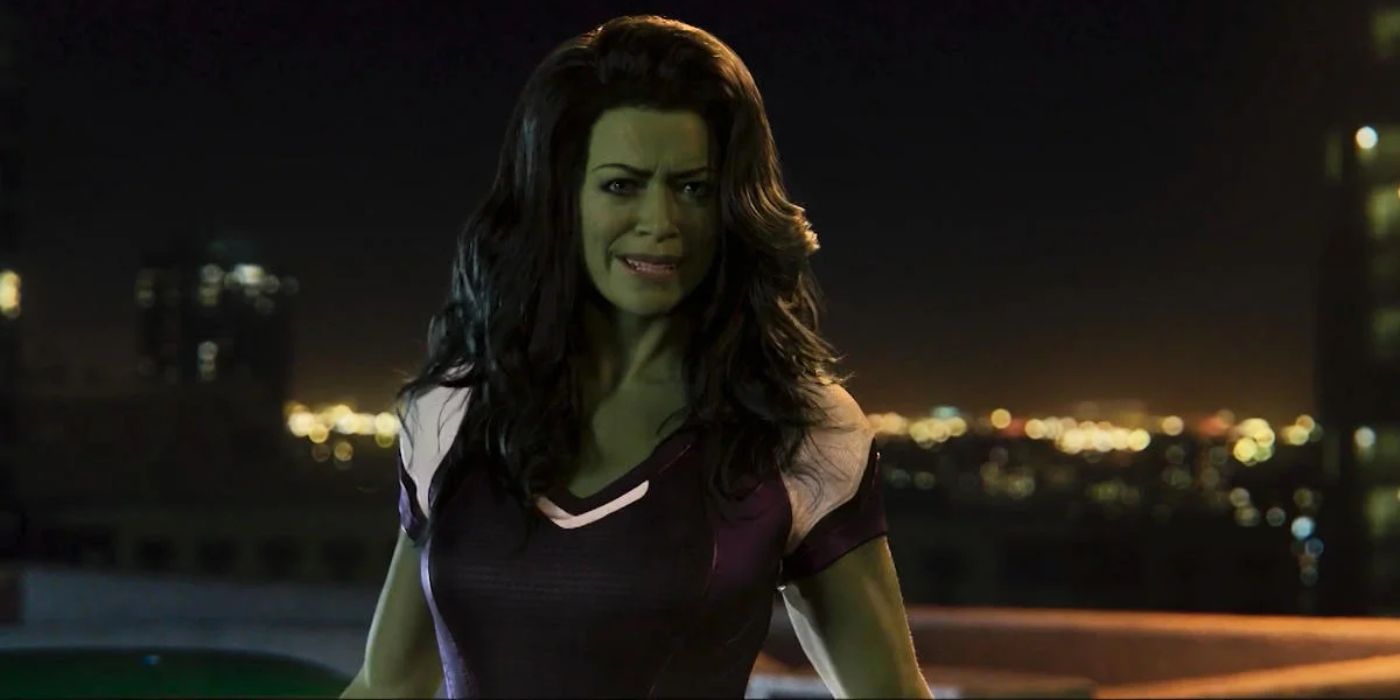Editor's note: The below contains spoilers for Episode 9 of She-Hulk.
The Marvel Cinematic Universe has been contending with a lot this year: splits in the multiverse, goings-on in New Jersey, weird skull-headed pigeon gods waltzing around Egypt. The MCU has kicked into full gear with the on-set of Phase Four and never has that been more obvious than with She-Hulk: Attorney at Law, the MCU’s first attempt at a half-hour comedy, which is all-new territory for them. The show has been carrying on with a lightness and a levity that many other MCU properties lack post-Snap, and was in line to be one of Marvel’s best projects, finally delivering on a female-created and female-led story with promise.
As of last week, there was so much promise in the direction the show was headed. After a wonderful appearance from the long-awaited Charlie Cox as Daredevil, She-Hulk headed into a kind of territory that the MCU has never touched before. They entered an arena that many female viewers thought of as revolutionary: dealing with the kind of cyber-attacks women (particularly those with public-facing careers) are subject to on the Internet, as Jen had a sex tape recorded and published without her consent, resulting in a Hulking-out that landed her in prison.
The end of Episode 8 presented an interesting set of questions at that point in She-Hulk’s narrative. Would the MCU contend with what it’s like for women, even when they’re heroes, to live in fear of doing anything that could be considered out of line? Would it comment on what it means to be a hero as a woman when Jen can’t shamelessly rage the way Bruce can? Would it give her a chance to finally accept her own internal rage at the entire situation, thus finally accepting her new existence as She-Hulk?
No, but apparently they’ll introduce her to the AI machine that supposedly controls the Marvel Cinematic Universe. Because that’s totally the better option here.
Coming from a long-time She-Hulk fan, the desire to go full meta with the series makes sense on paper. It’s what Jen is known for her, a longstanding bit that separates her from her cousin, Bruce Banner. She’s quirky, funny, a little off-kilter — and her quite literally ripping through the screen and into Disney+ itself might have been all of those things, had the writers not chosen to combine it with the Intelligencia storyline, something that demands much more tact and thought than meta can offer.
Revenge porn is a deeply serious, far too real phenomena that women — the kind that can’t transform into the Jolly Green Giant when they’re pissed — live in fear of every time they go out on a first date or talk to a guy at a bar, or even bother to open up to someone they already know. Weaponized sexuality is a painful reality that women of all kinds must contend with every waking moment of their lives, and She-Hulk makes nothing more than a passing nod at it, not even bothering to use comedy to make a commentary on the kinds of men who victimize women by doing such a thing.
Sure, there are glancing jokes made about the way these kinds of chauvinist men act (props to Pug for being uncomfortable calling women “females”), but at no point does the narrative actually indict their behavior. It doesn’t get a chance, because before it can, it takes a hard left off the Cliffs of Insanity by inciting a typical, Marvel-style “battle for the ages” as Hulk King himself actually transforms into a Hulk, chucking anything intelligent they might have had to say about so-called “meninists” out the window by turning Jen’s struggles into a set piece for a fourth wall break.
Frankly, I would’ve preferred if the writers had gone with what they deemed the cop-out route and just seen the ridiculous final battle through, instead of plucking Jen out of the narrative and having her shatter the fourth wall like a nameless goon (or is it henchman?) through a glass window. Sure, it’s in line with Jen’s history in the comics, where she literally bends the frames of panels to her will, but it feels like a pretty far jump from speaking to the camera to busting into the so-called “real world” entirely, even with the cracking of the multiverse in last year’s Spider-Man: No Way Home. Especially when it seems that her entire goal is to seek out K.E.V.I.N., a robot created for the sake of a joke that audiences will only understand if they’re so deep into Marvel that the water’s lapping at their eyeballs.
Meta works, but most often in small doses. Deadpool is a perfect superhero example of this, casually integrating a knowledge of the voyeur into its script in a way that aligns with its character — someone who doesn’t take anything too seriously, to begin with. Jen, on the other hand, funny as she is, takes her life and work very seriously. As she should; not only is she a woman in law, where she is already likely to be taken less seriously, but she must also contend with the burden of being incredibly visible, as a superhero who has no secret identity and is constantly being subject to the whims of the surrounding media.
By pulling Jen out of her own story, and putting her up against an AI instead of forcing her to contend with marrying She-Hulk and Jen Walters as one and the same, it posits that she can’t defend herself, either as She-Hulk or as Jennifer. She must seek out the help of an omnipotent being, and all the work the series did to advance Jen’s understanding of herself is lost the moment she comes face to face with that HAL-9000-looking piece of junk.
It’s almost as if the writer’s room saw the sequence in Robin Hood: Men in Tights where Cary Elwes says, “Let me see the script,” and thought, “How can we get away with that, but bigger and more bombastic, and take up a massive chunk of the episode with it?” It’s a lesser version of the end of Blazing Saddles, not committing enough to either of its own bits for the confusion to be worthwhile. There is no catharsis in its attempts to be funny because it’s so far out of line with what we’ve experienced up to this point that it doesn’t feel genuine.
Jen doesn’t get a final fight, or a final chance to prove herself to her friends and enemies, even in an outlandish way. It feels like a cop-out, quite literally written because the writers couldn’t figure out a tactful way to address the violence and hatred women are faced with every single day that would also align with Marvel’s style guide that demands fan service and an over-the-top ending. She-Hulk was already setting itself up to be the MCU’s Fleabag, in a way, but when lassoed by the constraints of Marvel’s style guide, it loses its tact in favor of fitting into a certain kind of box, one that almost feels like it’s getting smaller and smaller the larger the MCU grows.
By skipping over what is essentially the entire climax of the series, audiences are given no satisfaction. Jen doesn’t get her hero moment — and don’t call that monologue to K.E.V.I.N. a hero moment, because in no part of the multiverse would that inspire the same kind of feelings — and we are thrust back into “reality” without a proper conclusion. Todd is taken off to await trial, Blonsky is sent back to prison, and everything gets tied up with a neat little bow, like an off-stage death in a Greek tragedy: it’s convenient, so no one has to put in the work of making a dead body look convincing.
I don’t want to say She-Hulk was setting itself up to fail by incorporating a very serious plotline into a half-hour legal comedy, but the bones of that argument are there. It stings particularly viciously coming off the success of Werewolf by Night, which pushed Marvel into a whole new genre and told a complete and fulfilling story in less than an hour. She-Hulk was treading new territory for the studio in terms of being a straight comedy, but without the same kind of cohesion — valuing jokes over the actual point of comedy, which is to be a weapon against all the things wrong with our society.
There is no point in comedy without heart and sincerity. To once again steal from Mel Brooks, this time from his autobiography: “Without a valley, there is no peak. Without information, there is no joke. You’ve got to set things up.” There are no valleys in She-Hulk’s finale. Things move much too fast, and there’s no lead-up behind the punchline of the bad guys getting what they deserve. The “joke” of Jen’s fourth wall breaking comes out of left field and ultimately fumbles what could’ve been a fantastic bag in terms of storytelling in the MCU.
Marvel has done some fantastic work with women this year, including the adorable Kamala Khan in Ms. Marvel and the equally badass Layla El-Faouly in Moon Knight. Just last week, we were introduced to the mysterious and powerful Elsa Bloodstone in Werewolf by Night, and it seemed like the MCU was finally starting to get things right with creating real, honest portraits of women. I just hope Jen gets a bigger and better chance to shine soon.

